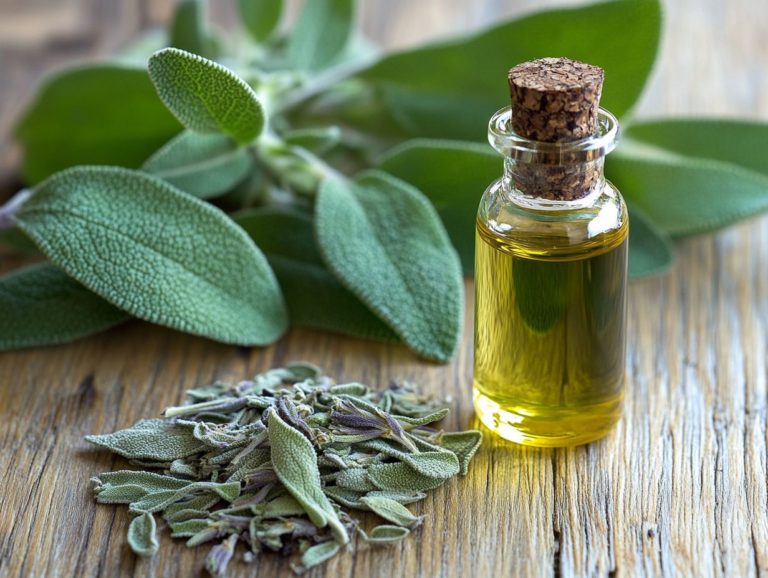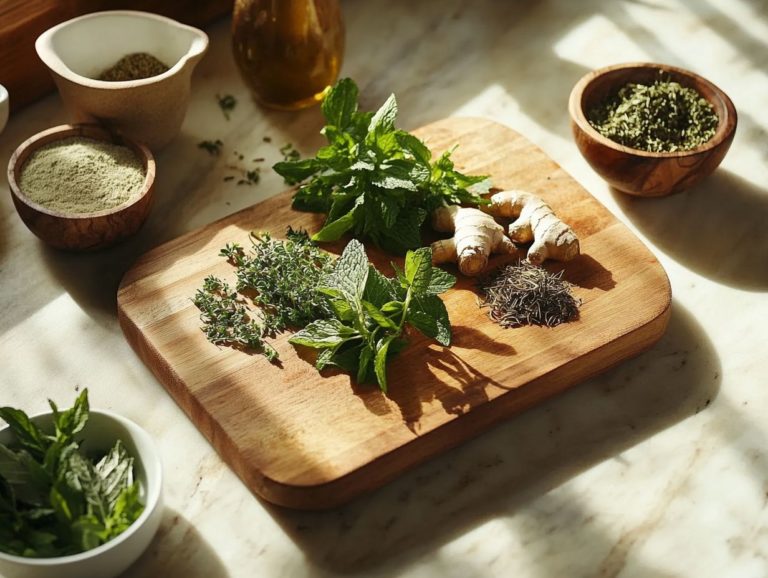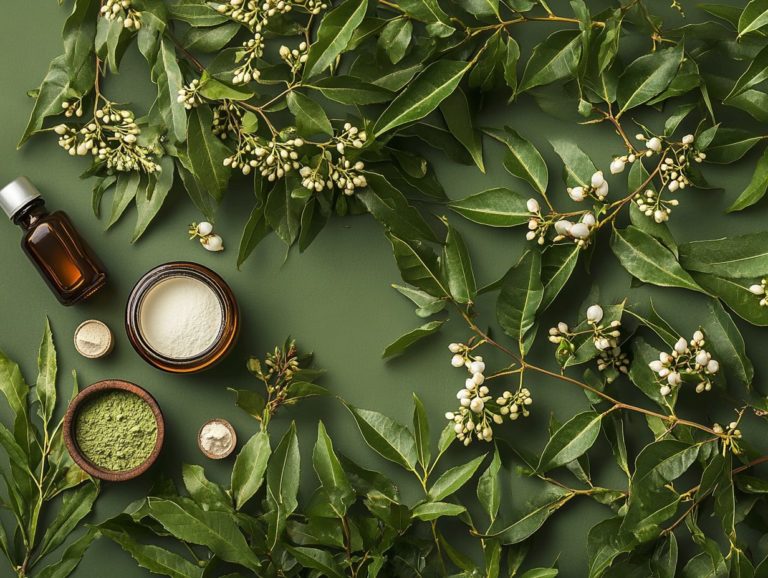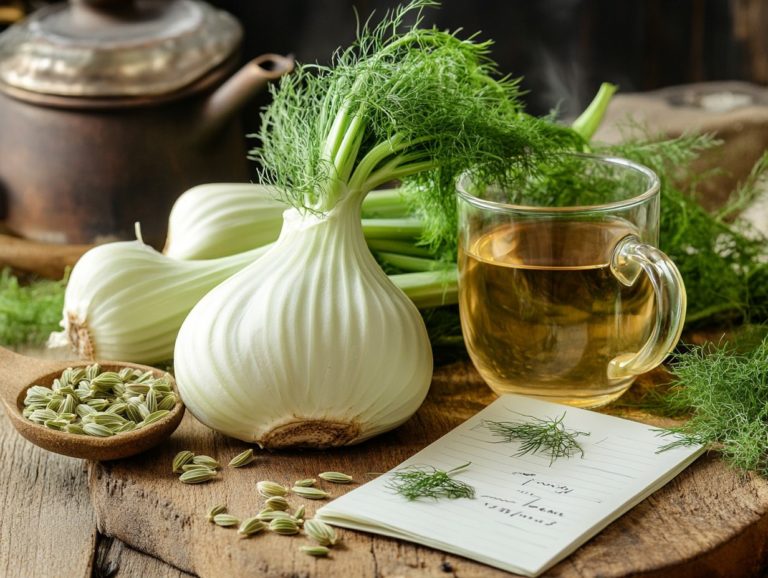5 Essential Herbs for Skin Health
When it comes to achieving radiant skin, nature provides plenty of healthy skin solutions.
Here are five essential herbs, each known for their skin-loving properties:
- Aloe Vera
- Turmeric
- Neem
- Rosemary, known for its antioxidant effects
- Chamomile
Each of these natural wonders has distinct benefits, from soothing irritation to reducing the signs of skin aging.
You’ll discover practical tips on how to easily incorporate them into your skincare routine, potential side effects like skin irritation, and other remarkable advantages they offer.
Prepare to elevate your skin health the herbal way!
Contents
Key Takeaways:

Aloe Vera is a powerful skin soother that helps with inflammation and irritation while enhancing skin hydration.
Turmeric reduces skin redness and improves overall skin health.
Neem treats acne and other skin infections effectively.
1. Aloe Vera: The Ultimate Skin Soother
Want to know how Aloe Vera can transform your skin? It s a powerful skin soother! It provides exceptional hydration and helps address imperfections, making it a must-have in many skincare routines.
Aloe Vera offers strong anti-inflammatory properties, making it ideal for reducing redness, swelling, and irritation. If you struggle with acne, eczema, or psoriasis, applying Aloe Vera can bring relief while promoting healing.
This versatile plant can be used in gel form for an instant cooling effect or infused in oils for deeper nourishment. You can also find herbal blends that use it, seamlessly fitting it into your daily routine for comprehensive skin wellness.
2. Turmeric: The Anti-Inflammatory Powerhouse
Turmeric is well-known for its strong anti-inflammatory qualities and offers fantastic benefits for your skin. It helps combat aging, reduces imperfections, and enhances radiance thanks to its rich antioxidants.
This vibrant spice plays a vital role in detoxifying your body, helping you eliminate harmful toxins that can cause skin issues. The active ingredient in turmeric, curcumin, effectively addresses acne, eczema, and psoriasis, promoting a healthier complexion.
You can easily add turmeric to your skincare routine through various natural products:
- Herbal teas for internal nourishment
- Topical applications like face masks
- Dietary additions in curries or smoothies
Each method revitalizes your skin and fosters a more luminous appearance, allowing you to experience turmeric s healing properties fully.
3. Neem: The Natural Antibacterial Agent
Neem is an essential natural antibacterial agent in your skincare routine. It helps tackle breakouts and ensures effective cleansing, making it a popular ingredient in many herbal remedies and products.
Its unique properties not only target blemishes but also soothe skin irritation and enhance moisture retention, providing a well-rounded solution for various skin types. Many skincare enthusiasts incorporate neem-infused extracts and oils into their daily regimen, enjoying hydration and a calming effect that reduces redness and discomfort.
By embracing the natural benefits of neem, you can achieve clearer, more radiant skin while also supporting your emotional well-being.
Start your journey to healthier skin today! Discover how 5 herbs that support healthy digestion can revolutionize your skincare routine.
4. Rosemary: The Skin Toning and Anti-Aging Herb
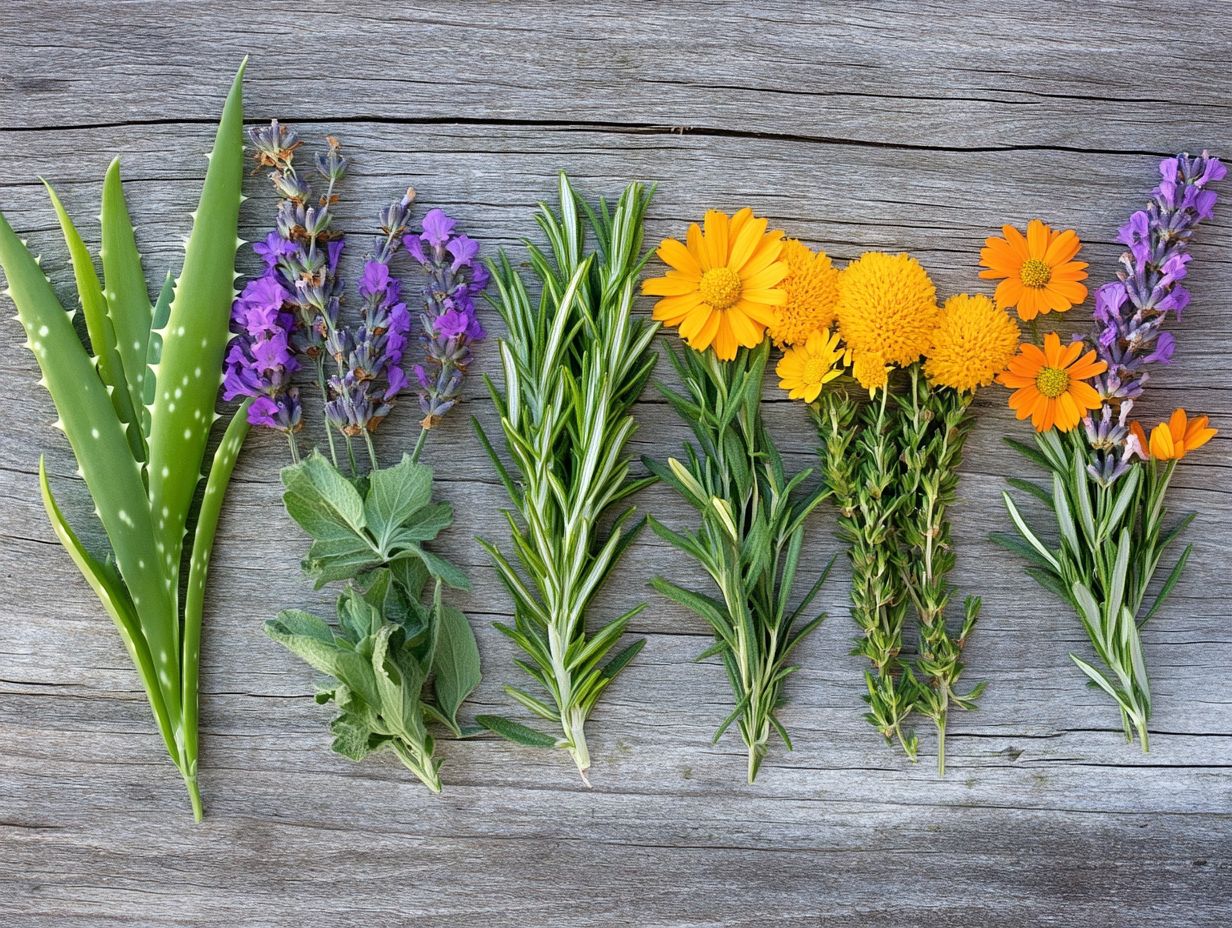
Rosemary is renowned for its remarkable skin toning abilities. It not only enhances your skin’s elasticity but also actively fights the visible signs of aging. This powerful herb is packed with antioxidants, nourishing your skin and promoting a radiant glow.
Add rosemary extracts to your daily skincare routine to unlock a wealth of benefits. It actively soothes inflammation and reduces puffiness, making it suitable for various skin types. You ll find these extracts in serums, creams, and facial mists, allowing effortless access to their restorative powers.
The benefits reach beyond just the skin. The aroma of rosemary offers therapeutic advantages, promoting relaxation and emotional balance. Its invigorating scent uplifts your spirit, making it a delightful addition to your self-care rituals.
Ultimately, this harmonious fusion of skin vitality and mental well-being makes rosemary an invaluable asset in holistic health practices, positively contributing to your emotional state.
5. Chamomile: The Calming and Healing Herb
Chamomile, celebrated for its calming effects, is an essential herb in your skincare arsenal. It works wonders in reducing skin irritation and promoting healing, making it a top choice for those who prefer natural solutions to skin issues.
Its soothing properties extend to your emotional well-being as well. Many find relief from anxiety and stress simply by sipping chamomile herbal teas, which envelop you in a serene sense of tranquility.
This versatile herb is often used topically in creams and ointments to provide comfort for conditions like eczema and rosacea. Incorporating chamomile into your meals enhances flavor and offers a host of health benefits, thanks to its anti-inflammatory properties.
How to Use These Herbs for Skin Health?
Incorporating herbs like Aloe Vera, Turmeric, Neem, rosemary, and Chamomile into your skincare routine can significantly enhance your skin health by addressing various issues and providing nourishing benefits through herbal remedies and dietary interventions.
One practical approach involves creating herbal blends tailored to your specific skin type. For instance, mixing Aloe Vera gel with Turmeric powder yields a soothing mask that targets inflammation and acne. Just combine one tablespoon of each and apply it for 20 minutes before rinsing with warm water.
Add Neem oil to your moisturizer to help combat excess oil and blemishes. Don’t overlook dietary interventions drinking Rosemary tea supports your skin’s vitality and easily fits into your daily routine.
For an added boost, mix chamomile with honey to create a gentle scrub that exfoliates and calms your skin. These simple yet effective treatments can make a noticeable difference in your skincare journey.
What Are the Different Forms of These Herbs?
These traditional herbs can be leveraged in various forms think herbal supplements, extracts, teas, and oils each offering unique benefits for enhancing skin health and tackling pesky skin imperfections.
For example, herbal extracts are concentrated powerhouses, delivering potent compounds directly to your skin. They work wonders for boosting hydration and calming irritated skin. You can also enjoy herbal teas, either by sipping them or using them as a soothing facial rinse. Their antioxidative properties promote well-being from the inside out.
Herbal oils are excellent moisturizers that lock in hydration while providing anti-inflammatory benefits. They effectively soothe redness and reduce puffiness. Together, these diverse applications of herbs play a vital role in enhancing skin vitality, ensuring your complexion remains resilient and radiant.
Try these herbs today and feel the difference!
What Are the Possible Side Effects of Using These Herbs?

While herbs like Aloe Vera, Turmeric, Neem, Rosemary, and Chamomile have a wealth of benefits, it’s crucial to be aware of their potential side effects. These may include skin redness or discomfort and unwanted immune reactions, particularly in sensitive individuals.
Each herb can interact differently based on your unique health conditions. It s wise to prioritize patch testing, which is a small test on your skin to check for reactions, before applying them topically. Consulting with healthcare professionals can offer personalized guidance, ensuring any potential risks are thoroughly addressed. If you have allergies, approach these herbs with caution and consider starting with a diluted concentration.
Taking these simple steps allows you to unlock the full potential of these amazing herbs! You can maximize their positive effects while minimizing the chances of negative reactions and ensuring your skin’s resilience against environmental pollutants.
How Can These Herbs Be Incorporated into Your Skincare Routine?
Incorporating herbal remedies into your skincare routine can be achieved through various elegant methods. Use herbal oils for targeted skin treatments, implement herbal cleansers, and embrace dietary interventions that promote skin health from within.
Crafting a homemade herbal toner is a delightful experience! Simply steep green tea and add a splash of apple cider vinegar for an invigorating cleanse that refreshes your complexion.
You can also explore skin-nourishing herbs like calendula. Blend it with honey and yogurt to create a hydrating and rejuvenating face mask that does wonders for your skin. Delving into these options elevates your routine and cultivates a richer connection with natural wellness.
What Are the Other Benefits of These Herbs?
Beyond enhancing your skin health, herbs like Aloe Vera, Turmeric, Neem, Rosemary, and Chamomile come with a treasure trove of additional benefits! They promote emotional well-being and deliver antioxidants that support overall skin hydration and vitality.
These remarkable botanicals have been linked to improved immune responses and stress reduction. For example, Turmeric‘s curcumin content has been shown in studies to combat anxiety and depression by boosting serotonin levels. Chamomile is celebrated for its calming effects and often serves as a natural remedy for insomnia and stress, supported by both anecdotal evidence and research.
Neem s antibacterial properties highlight its essential role in strengthening your body s defense mechanisms. Rosemary has been found to enhance cognitive function and memory, offering a clearer mind and a greater sense of overall wellness.
Are There Any Situations When These Herbs May Not Be Suitable for You?
While many herbs offer substantial benefits, it s crucial to recognize these risks now to protect your health! Be aware of contraindications, especially if you have specific skin conditions or allergies to herbal remedies.
If you have eczema or psoriasis, be cautious with herbs like calendula and chamomile, as they might exacerbate inflammation or trigger allergic reactions. If you’re taking anticoagulant medication, avoid herbs like ginkgo biloba, as they can increase the risk of bleeding.
For those who are sensitive or have underlying health conditions, consulting a healthcare provider before introducing new herbal treatments is a smart move. There are safe alternatives available, such as aloe vera for soothing skin issues or turmeric for its anti-inflammatory properties. Additionally, you can explore 5 common herbs with healing properties, allowing you to benefit from natural healing without the risk of harmful interactions.
Frequently Asked Questions
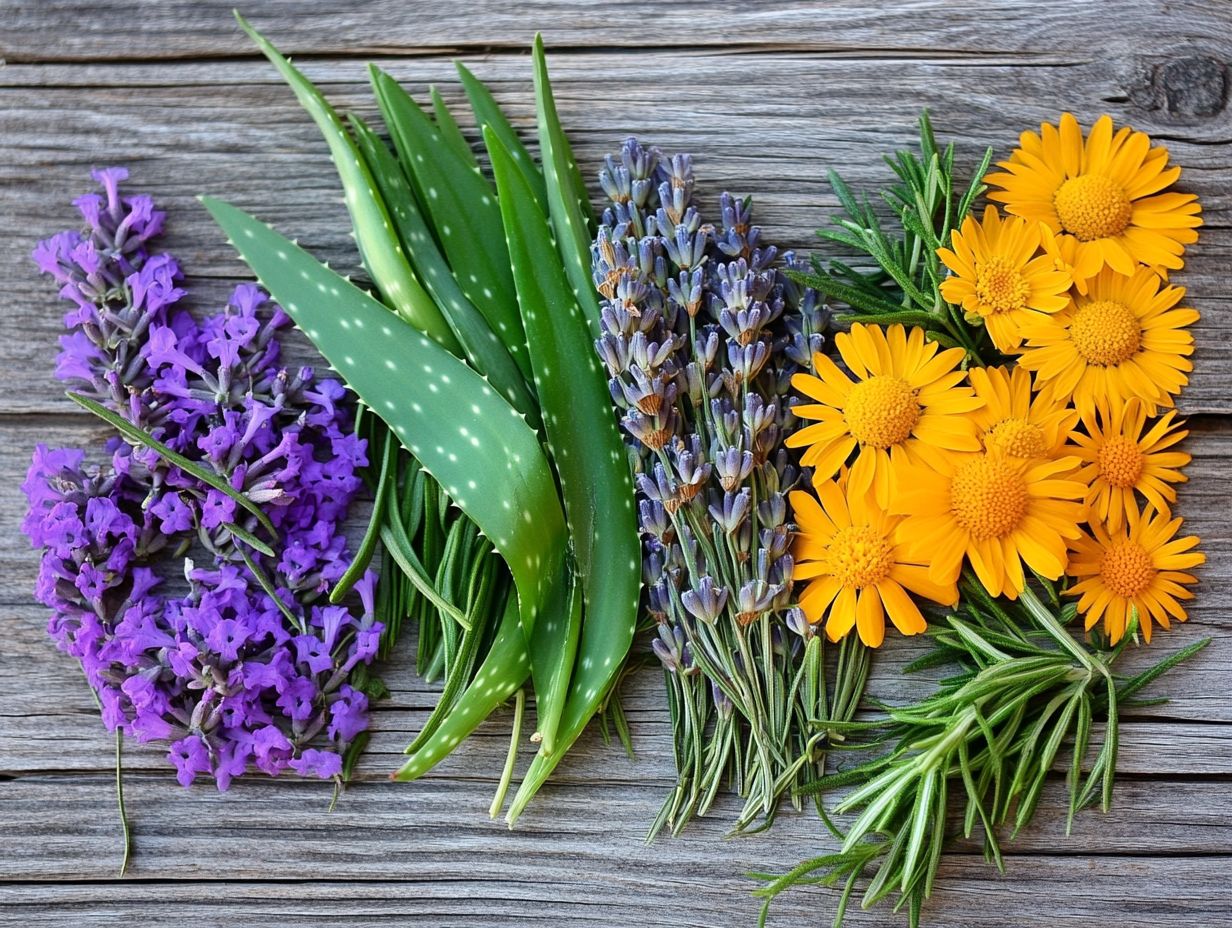
1. What are the 5 essential herbs for skin health?
Five essential herbs for skin health are turmeric, aloe vera, neem, rosemary, and chamomile. These powerful herbs can transform your skin’s health and appearance!
2. How does turmeric benefit the skin?
Turmeric is known for its anti-inflammatory and antioxidant qualities. It can reduce inflammation and protect the skin from harmful free radicals.
This herb may also lessen the appearance of scars and dark spots.
3. What makes aloe vera good for skin health?
Aloe vera is packed with vitamins, minerals, and amino acids that nourish and hydrate your skin. Its anti-inflammatory properties soothe various skin conditions.
4. Can neem improve skin health?
Absolutely! Neem’s antibacterial, anti-inflammatory, and antifungal properties tackle acne and eczema effectively. It can also brighten your skin and refine its texture.
5. How does rosemary contribute to skin health?
Rosemary acts as a natural antiseptic and reduces inflammation. It helps heal skin issues like eczema and psoriasis.
This herb is also rich in antioxidants, shielding your skin from environmental damage.
6. Can chamomile help with skin irritation?
Yes, chamomile is fantastic for calming irritated skin! Its anti-inflammatory properties soothe redness and sensitivity.
Using chamomile can also improve your skin tone and help reduce fine lines.

